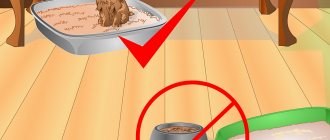Cats, even the most prosperous ones, usually don’t mind stealing a piece or two from the table or rummaging through the waste from the trash can. Neither bowls full of food nor the indignation of their owners stop them. The habit of stealing food develops in cats for various reasons and the problem should be approached in a comprehensive manner.
Uniformity of feed (lack of nutrients)
To keep your cat healthy, fit and active, her diet must be nutritious and balanced. Receiving monotonous food with the same set of nutrients, sooner or later the animal will begin to experience a lack of some of them.
To replenish the missing energy, the pet begins to look for additional food. And it doesn’t matter that the food of interest is outside the cat’s bowl.
Sources of essential nutrients can be:
- garbage dump;
- other people's food bowls;
- bin;
- household food (set table, meat or fish left in the sink to defrost, unsorted bags of groceries, refrigerator).
You need to: review your pet’s diet, diversify its diet, prepare and buy only high-quality food that includes a large complex of nutrients.
Habit
Some cats have a habit of eating small meals so they can have a snack later. Such individuals do not want to leave the remains of their dinner unattended when they have already eaten, so they begin to scratch with their paws next to the bowl.
The habit of burying food is often observed in cats that were once strays. Even though they already have loving owners, pets still continue to bury food after they have eaten. So they are trying to create reserves in case of hungry times.
In addition, the pet will try to bury food if it is unexpectedly decided to switch it to another food that it is not used to. A kitten who grew up in a nursery and ate exclusively prepared food there simply will not understand what to do with the meat, and will most likely begin to bury the bowl of food.
Hunting instinct
Cats by nature are predatory animals and natural hunters. Even well-fed pets are no exception. At home, the need to realize instincts, practice and train hunting skills can make them cunning and dexterous thieves. This can happen if:
- they lack activity, they run and jump a little;
- they do not receive rewards (loot) after playing.
The role of prey is given to food left unattended. The theft is carried out in the form of a game and consists of the following stages:
- tracking;
- ambush;
- attack;
- eating.
Everything is like that of predatory animals in the wild.
Need: more time to play active games. At the end, offer a treat (prey).
Spreads claws
Absolutely all cats sharpen their claws - this is required by their hunting instincts. After all, in the apartment on the path of a domestic predator at any moment there may be tasty prey or a dangerous rival. This means that the beast must always be fully armed! Therefore, you will not be able to convince your pet. And you should only worry if the cat uses furniture or door frames instead of its scratching post.
Another reason may be that your cat is not yet a fully grown animal. In childhood, cats often have attacks of uncontrollable rabies. And then the animal eats everything that gets in its way. In this case, you should not scold your pet. Just unhook it from the surface that the animal has chosen as a scratching post and calmly, but clearly and firmly say “no!” 3-4 times.
Then take his front paws with his claws extended and repeat the scratching motion on the scratching post several times. After this, be sure to reward your pet with a kind word and a favorite treat.
As a radical remedy, the cat’s claws can be cut off. But this will solve the problem only for a while. After the claws grow back, the animal will again take up its work.
There are also special covers for claws. But in order to put them on you will have to tinker quite a bit. In addition, your pet will constantly try to remove them. In any case, only the owner can decide whether the safety of his furniture is worth such efforts. If your cat begins to struggle and scratch when he is picked up or simply petted, then it is quite possible that he simply cannot stand being touched too often.
Also, cats and cats most often do not like it when they are caressed against the grain or touched on the stomach. In cats, the abdominal area is the most vulnerable place and only the closest people are allowed to it. Those that the animal absolutely trusts.
Quite often, cat owners complain that their pets have developed a habit of ambushing children and adults. Most likely, the cat is not satisfied with its place on the hierarchical ladder in its “pack”. This can happen if a small child appears in the house, or children and other animals begin to mock her. Such antics of an animal can be quite dangerous for all family members and are quite difficult to stop.
To correct the situation, owners need to try to regain the trust of their pet. To do this, you just need to give your cat more time, take better care of it and play with the animal more often. In addition, you need to make it clear to children that animals cannot be teased or offended. And for a while, try not to leave your pet alone with children. If the measures taken still do not affect the situation in any way, the animal will apparently have to be given to other people.
The habit of occupying all horizontal surfaces is inherent in many cats. Cats and cats simply love to sleep in specially equipped cat houses and ordinary cardboard boxes. But, looking for a warmer place, representatives of the feline family go to sleep not only in special places designated for them, but also on any surfaces where it is at least a little warmer than in the rest of the apartment. For example, on a radiator, a windowsill heated by the sun, or even in the owner’s bed. Or directly directly on the sleeping owner. How to deal with this?
Many people, of course, like to lie in bed with their pet, but, of course, not everyone. And if your cat still bothers you in bed, just show him his place. If you constantly and persistently chase the cat out of bed, it will eventually understand that the place of the “leader of the pack” cannot be taken and will move to sleep in another shelter.
Desire to attract attention
Pets, like children, really need communication. They need not only to be fed, watered and stroked periodically. Cats should spend time playing with them. If attention is not enough, it is begged for, knocked out or scratched out. Stealing can be one of the ways to attract attention. For them, it's more of a game called "Catch Me If You Can." Having started such a game, the cat can safely count on the unusual activity of the owners and a surge of close attention to his person.
You need to: devote more time to the cat (petting, playing, walking).
Curiosity
Cats are very inquisitive and there is an explanation for this:
- the need to control one’s territory and the events occurring on it;
- desire for security.
Curiosity encourages your pet to check out its possessions and be interested in the surrounding smells. It is not surprising if, having discovered an exciting aroma from the table, the cat wants to get to know its source better. Why curiosity can turn a cat into a repeat offender:
- Having tried the owner’s food at least once out of curiosity, the cat may “get involved” and raids on the table will become regular.
- If the smell comes from food (prey), this is wrong from the cat’s point of view. Food must be examined, tasted and “hidden” from potential competitors so as not to be stolen.
Do: do not leave food not intended for the cat in accessible places.
What to do if your cat starts eating a lot
Now let’s look at what to do if an animal is overly hungry.
If your pet begins to ask to eat more often, and the amount of food eaten has become larger, then first of all you should pay attention to the balance of the food. Perhaps it's time to change the food to something more nutritious. But you don’t need to get carried away and give your cat food in excess of the norm.
It is also necessary to exclude all possible pathologies described above, and carry out treatment for fleas and worms.
Young and growing animals can be fed more than usual
Sometimes overeating is associated with the breed and personality traits of the pet. In this case, an extra portion will not harm him, especially if we are talking about a young cat: active and energetic.
Since cats love to eat delicious food, it is important for the owner to feed the pet in such a way that its body replenishes energy in a timely and efficient manner. Then it will be easier to understand when the cat gets sick and his eating behavior changes.
Temptation
Cats have an excellent sense of smell, many times greater than the human sense of smell. In the animal world, smells are one of the valuable sources of information. They will tell you what is where and who is where. The aromas of food have a particularly exciting effect. Goodies left unattended tempt the cat, making him forget about a full bowl, good manners and the threat of punishment. Walking past a table with food and not trying to steal a piece is a difficult task even for the most well-mannered pet.
Do: do not leave food and leftovers on the table or in other accessible places.
Deterrents and sounds
How to stop a cat from climbing on tables? All animals are different, some are obedient, others are cunning and capricious, and you can assume that some will not fall for your tricks. Any ban for them is a kind of challenge. Of course, you need to use all options. The usual words that you can’t do this will also work. After all, no one has yet canceled the conditioned reflex. You can use a few drops of essential oil or vinegar and pour the liquid onto the table. This should also help wean your pet from climbing. Perseverance and work will yield results.
You need to devote at least two weeks to the issue that worries you so much. You can also use loud sounds, children's toys, loud rattles, and various squeaks to prevent the cat from jumping on a forbidden object. The sound should be unexpected and very loud at the moment of the jump. The animal will become frightened and may no longer try to jump onto the table.
How to wean a cat from stealing
It will take time and patience to wean your cat from stealing. Not only pets, but also owners will have to change their habits:
- Never leave food on the table unattended, whether the table is set for a meal, leftovers after a meal, or food just brought from the store.
- Never leave dirty dishes with food leftovers in the sink.
- Never feed your cat from your plate.
- Never throw tasty morsels from your table onto the floor (it’s better to put them in a bowl after a meal).
- Block the animal's access to the trash can.
- Review your diet and pay more attention to your pet (including active games).
- Clean food and water bowls frequently.
Important:
- follow the sequence of actions;
- keep to the plan;
- All family members should act harmoniously, avoiding situations where one prohibits and the other allows.
Caring owners just need to understand the needs of their pet, adjust their habits and set aside time for full communication with their pet. This approach will help rehabilitate the thief or significantly reduce losses from his raids.
Scotch tape and spray bottle
How to stop a cat from climbing on tables using tape? Now we will tell you in detail. Try sealing the kitchen table with double-sided tape. Leftover wool on the table and cleaning up tape are unpleasant consequences of this method. But believe me, the result is worth it. Contact with the tape will cause the cat to dislike the table. He will be put off by the desire to lick sticky paws for a long time.
Any means are suitable for the desired result. It's no secret that cats don't like water.
If the cat wants to jump on the kitchen table again, you need to quickly spray it with a regular spray bottle. This simple repellent maneuver should work. An important point is the fact that the pet should not be afraid of its owner, who is making various attempts to eradicate the bad habit, but the very method of combating it.











